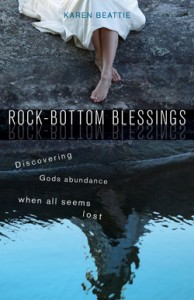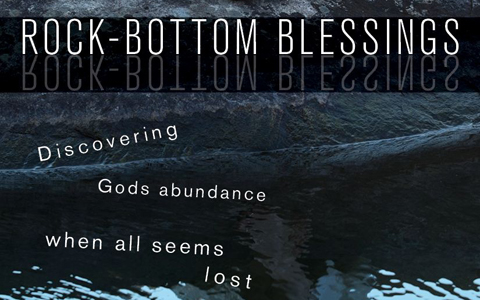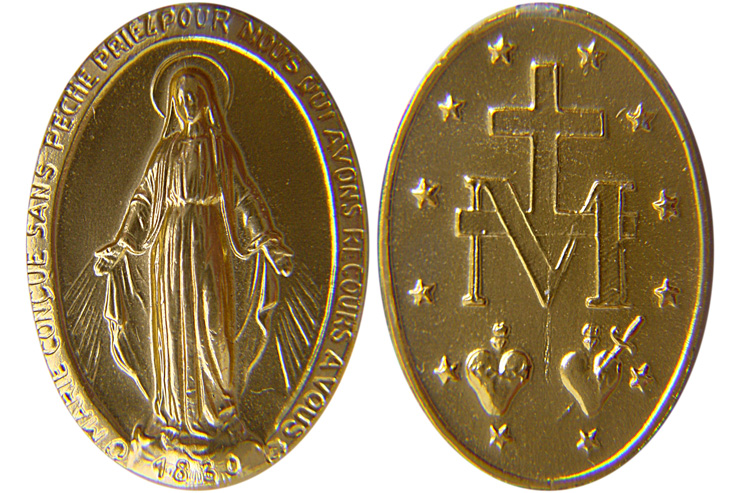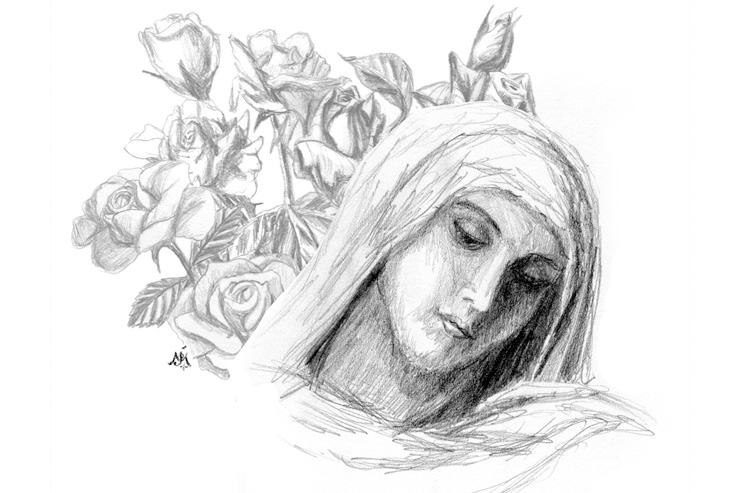 A few weeks ago, I found myself reading the new book by Karen Beattie, Rock-Bottom Blessings: Discovering God’s Abundance When All Seems Lost. It’s a book that struck me in many ways, and I’ll never think of the word “rock” quite the same way again.
A few weeks ago, I found myself reading the new book by Karen Beattie, Rock-Bottom Blessings: Discovering God’s Abundance When All Seems Lost. It’s a book that struck me in many ways, and I’ll never think of the word “rock” quite the same way again.
The idea of seeing everything as a blessing is one that sounds good, and one that I have a lot (A LOT) of trouble with. Because, you know…life sucks sometimes. Or a lot of the time. And that’s a BLESSING?
Beattie tackles this topic, and well!, in Rock-Bottom Blessings, and she was kind enough to share a few words with me about the book and her process in writing it.
Karen, your book has the premise that blessings and disappointments go hand-in-hand. You share some pretty intimate stories and bare your heart to your readers. What possessed you to do this? (Yes, I’m in awe of you.)
I think being vulnerable is all a part of being a writer. But I did have a minor panic attack once the book was published and I realized that people—friends, family, acquaintances, and people I’ve never met—would actually be reading all of the sordid details of my life! My husband laughs at me. I wanted to get a book published for so long—but then when it was published I didn’t want anyone to read it.
But what possessed me to write it was the belief that healing can come when we tell our stories. I wrote the book for myself, to work out my feelings and thoughts about what was happening in my life and where God was in it all. But I also felt compelled to write it so others who are facing similar struggles might find hope.
As you tackle the topic of abundance and redefining it through a lens of God’s presence in the midst of our suffering, you keep an attitude of gratitude. How did gratitude shape your approach to your many struggles and difficulties?
Well, I’m not sure I really kept an attitude of gratitude. There were times when I felt so cheated because I thought God was giving everyone else good things, but that he had just forgotten about me. But eventually I did learn to see the good things could come from loss and grief and struggle. That’s a bit different than just having gratitude.
It’s fine to keep a gratitude list, and I know that helps a lot of people—including me. But I also think it’s important to really face the grief and loss you may feel, whether it’s the loss of a dream, the death of a loved one, or a financial crisis. If we can get to the point where we are grateful even for the difficult parts of our lives, well, then, I think we’re starting to understand a deeper kind of abundance. I’m grateful for all of the things I learned in the process of working through my struggles.
What advice and insight do you have for those who struggle and seem to have no end in sight?
Wow, it’s hard. Really hard. Sometimes it feels like the suffering will never end. But if you believe in the paschal mystery—the life, passion and resurrection of Christ—then there is always hope. There’s always something good that comes from struggle. It may take a long time to see it, but I believe it’s always there.
I would also say that having an understanding community surrounding you—a community that reminds you daily of resurrection—is also very important. And continuing to practice your faith by going to church, because that’s often where we are reminded who we really are in God’s eyes.
You mention leaning on the paschal mystery for strength in your own journey. Why does this comfort you? How did you reach this point in your faith walk?
I never heard of the term “paschal mystery” until I started hanging out with the Catholics. But once I heard that term, I suddenly had words for what I had experienced in past losses and grief.
My mother died suddenly when I was in my 30s, and it was the most terrible thing I had experienced up until that point in my life. There was obviously deep grief, but oddly, I was also grateful for certain things that came out of that loss. For instance, my family grew closer together and healed in many ways, the community that surrounded us during that time was amazing, and personally, I became a much more compassionate person.
After my mother died I had never felt so alone in my life. But even my loneliness was a gift because I had no choice but to cling to God. All of these “good” things that came from losing my mother, I now call “little resurrections.” I think we experience this type of resurrection throughout our lives, and now I finally have a term for it.
If you believe in the paschal mystery, then you believe that no matter how dark the circumstance, there will be resurrection in some way. And that gives me hope.
And, because I can’t help but wonder: how many pounds of chocolate did you consume in the midst of writing this book and sharing these experiences? Do you have any great chocolate tips for the rest of us? 🙂
Ha! Lots, I’m sure. I tend to eat when I’m stuck on a particularly hard part of the writing. Eating and pacing helps me to work things out in my head. Author Paula Huston once said that fasting is an important spiritual practice for writers, and that she fasts when she is working on a book. Maybe I will have to try that next time.
As for chocolate tips — I recommend the mini candy bars (Twix are the best), and little Dove chocolate squares. I eat a few of those and don’t feel guilty because they are small. Barely any calories, right?
Sarah Reinhard is a Catholic wife, mom and author whose nose is probably in a book if she’s not scraping something off of her shoes. Her latest book is A Catholic Mother’s Companion to Pregnancy: Walking with Mary from Conception to Baptism. Check out all of her books at http://sarahreinhard.com/writing/my-books/.
Visit Sarah’s website: http://sarahreinhard.com/
If you liked this article, please share it with your friends and family using the Share and Recommend buttons below and via email. We value your comments and encourage you to leave your thoughts below. Thank you! – The Editors














